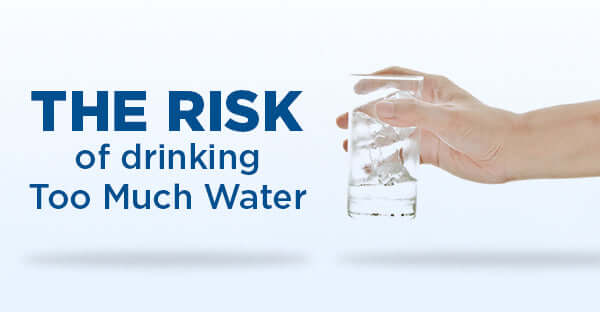Drinking too much water isn’t usually a problem that most people encounter; it’s usually the opposite.
We often hear medical professionals telling us to drink at least eight glasses of water a day. However, after years of research, evidence shows that this advice may have only been a health guideline and does not support a scientific basis at all!
According to the World Health Organization's (WHO) health issue entitled, Water Quality Monitoring, the amount of water to be consumed is dependent on the quality and quantity demands of each individual.
The amount of water needed by an individual is entirely dependent on the body of the individual. It’s not a one size fits all approach!
Your Body Is Always Burning Up Fluid
Every day, while you’re about your business; living, moving and breathing, fluid loss is experienced in a variety of ways through:
evaporation, breathing, urine, and sweating.The replacement of such fluids is essential for the body to function correctly, so drinking less water as needed may do more harm. The body’s thirst mechanism is a good guide for how much you should be drinking.
How Much Water Is Too Much?
Can you drink too much water? Is it even possible?
The short answer is yes.
When you increase your water intake unnecessarily (and I mean a lot), your body cannot process the intake efficiently, and you will suffer from what is commonly called water intoxication or overhydration.
This is most common in infants under six months and in athletes.
Water intoxication is much less common in young adults because the kidneys can generally process 15 litres of water every day. This volume is more than what most regular adults can consume in a day, but one can only try.
What Is Water Intoxication
Water intoxication is when the body has a rapid intake of water which causes a disturbance in the electrolyte balance. Electrolytes are the electrically charged chemicals that allow your cells to carry electrical impulses (nerve impulses, muscle contractions) across themselves and to other cells. When the body’s electrolytes are out of balance, its functions begin to suffer. There is only so much water that the kidneys can process; thus, the rapid intake of water in short intervals may damage the kidney’s ability to filter.
The Journal of Clinical Pathology studied a 64-year-old woman who had a severe heart condition caused by the deterioration of the valves.
Her medical reports indicated that on the night before her death, she began to drink water on impulse, about 30-40 glasses. Later in the evening, she became hysterical, had episodes of vomiting and nausea, then fell asleep and never woke up. After her body was assessed, it was clear that she had a case of water intoxication.
Overhydration Symptoms
Initial symptoms of intoxication are hallucinations and confusion. In severe cases, seizures, comas, and death.
Immediate medical attention should be administered if you or someone else suspect they may be suffering from Water Intoxication.
How Much Water Should Be Consumed in a Day?
Listen to your thirst. Drink to satisfy your thirst, not to reach an arbitrary intake goal.
Our need for water is very dependent on the kinds of activities we do every day.
Activities that cause you to exert energy and consume water require you to drink enough water to replace what you’ve lost.
According to Kidney Health Australia, the 8 glasses a day rule does not necessarily apply to all.
Daily water intake should be thoughtfully increased during periods of strenuous exercise, when undergoing medical treatment or when living in hot climates.









